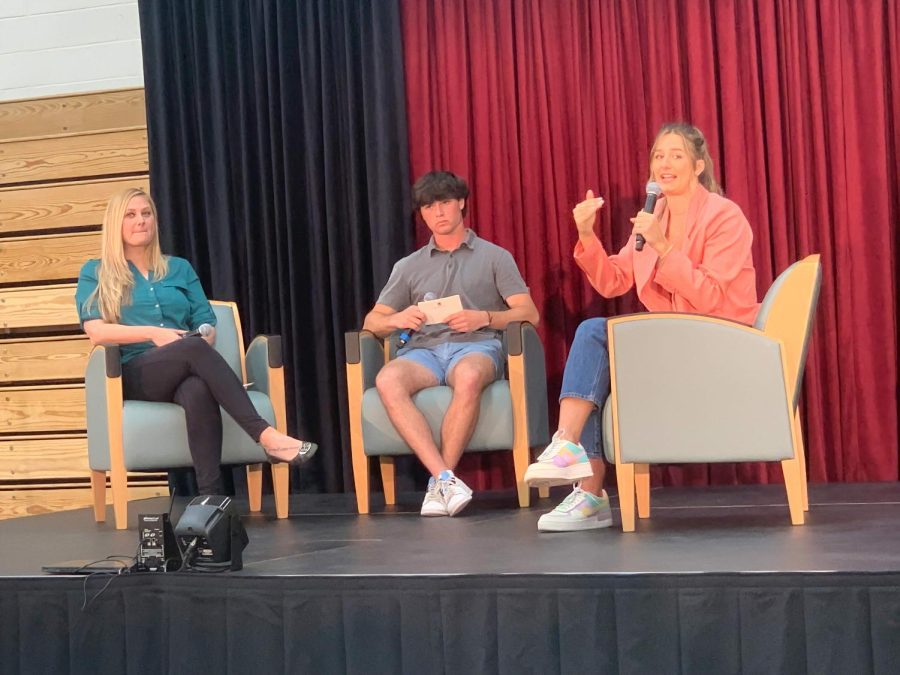Mental health nonprofit founder speaks to students
Lucas Cohen-d’Arbeloff/Chronicle
The Hidden Opponent founder Victoria Garrick gestures out to the audience during her question-and-answer session with Avi Carson ’22 and Mental Performance Coach Kat Scardino.
March 26, 2022
The Hidden Opponent founder Victoria Garrick spoke to students about mental health during Community Flex Time on Thursday. Garrick played volleyball at the University of Southern California before becoming an influencer and founding her nonprofit organization focusing on the stigma surrounding student-athletes’ mental health.
Garrick began the event by explaining how she struggled with mental health while playing college volleyball but felt unable to seek out the necessary resources.
“As I was experiencing anxiety, all I could come up with was, ‘I’m not cut out for this; I’m not good enough,’” Garrick said. “‘I don’t see anyone else struggling. I don’t want my coach to know, [because] he’s going to pull me. I don’t want my teammates to know [because] they’ll never trust me. So [I just] suppress, suppress, suppress.’ And as a result of not really owning and confronting what I was experiencing, things got worse.”
Garrick said focusing less on her appearance on social media helped improve her mental health.
“I really started to think [that] I want to post what I want to post because it makes me feel good,” Garrick said. “I don’t need other people to validate me. It was really a part of my healing experience, [thinking] I don’t have to succeed and achieve to get everyone to validate me.”
Through The Hidden Opponent, Garrick created a platform for student-athletes to share personal stories and narratives about their mental health journeys. She also tours the country to encourage high school and college students to become more in touch with their own mental health.
In response to a student question about sleep practices, Garrick said prioritizing rest ultimately leads to a better state of mind.
“I’d say if you’re struggling to fall asleep, mindfulness and meditation are helpful,” Garrick said. “And then I would also say if it’s hard for you to focus on eight hours of sleep, try to think about your overall schedule and where you can just incorporate more downtime and more rest. That helps me.”
Donya Ghassemieh ’23 said Garrick’s address helped her reevaluate the importance of mental health while maintaining a heavy workload.
“She was really nice, and she opened up my eyes to something that I didn’t think about, that I have to think about the tasks that I’m taking on and how they affect me,” Ghassemieh said. “If I’m feeling really stressed, maybe I should reduce my workload.”
Sophomore Prefect Glory Ho ’24 said she was able to relate with Garrick and her experience as a student.
“I really liked [Garrick’s] energy,” Ho said. “I think because she was so cheerful and energetic, she made the hard topic of mental health easier to deal with. I also think that because she’s not too much older than us, it was easier to connect and relate to her story.”































